Build my resume
- Build a better resume in minutes
- Resume examples
- 2,000+ examples that work in 2024
- Resume templates
- 184 free templates for all levels
- Cover letters
- Cover letter generator
- It's like magic, we promise
- Cover letter examples
- Free downloads in Word & Docs

5 College Student No Experience Resume Examples & Templates [Edit Free]
College Student No Experience Resume
- College Student No Experience 2
- College Student No Experience 3
- College Student No Experience 4
- College Student No Experience 5
- Resume Writing 101
Sometimes, ambitious college students can’t wait to start working. Janee considered how to show value on her resume as a grad: Dreaming of working as a business analyst at Resource Data fueled her to research the company and think of relevant college achievements.
Janee recalled real projects from her degree in math and economics that saved a local manufacturer thousands. Even her stint as basketball captain highlighted her ability to organize, boost morale, and drive positive results.
Referencing her class movie recommendation project and the time her random forest model outperformed projections by 19 percent, Janee topped off her college student no experience resume with a career objective . Bam—hired. Try our resume templates for yourself; we can’t wait to applaud your success, too!
or download as PDF
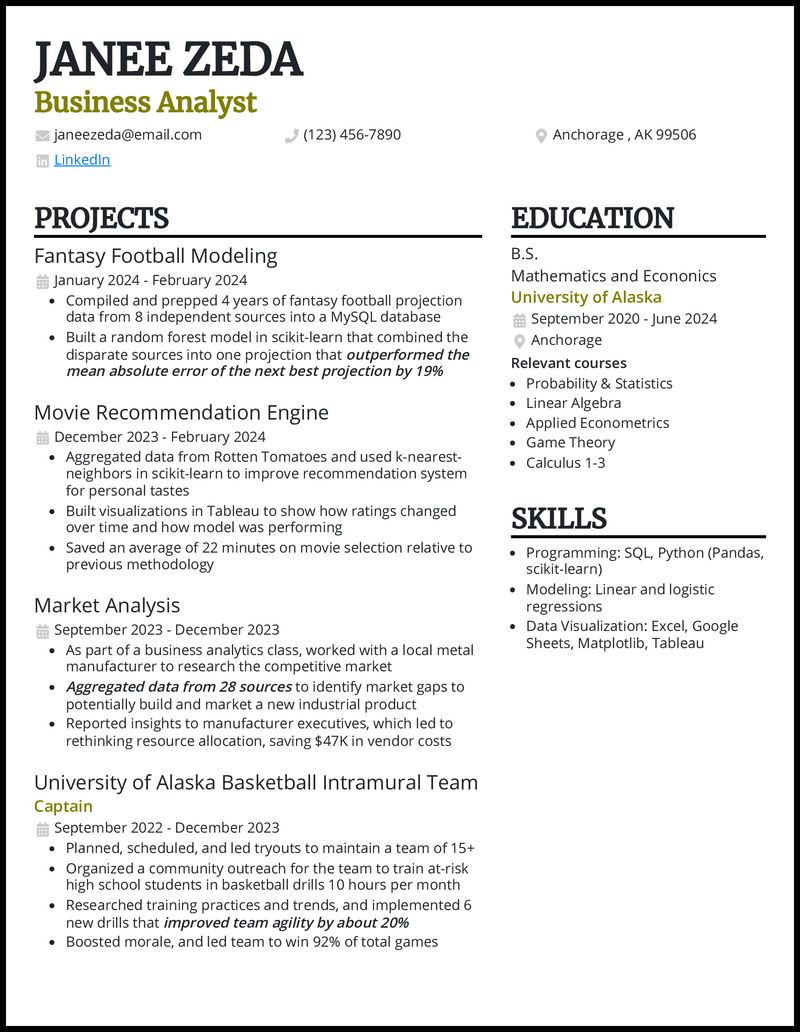
College Student No Experience 2 Resume

College Student No Experience 3 Resume

College Student No Experience 4 Resume

College Student No Experience 5 Resume

Related resume examples
- Current College Student
- College Student Internship
- College Graduate
- Grad School
- College Student
What Matters Most: Your Skills & Background Experience

When you lack experience, your skills become more important than ever! As a college student, you now have a nice, clear understanding of what you can do, and recruiters want to know all about it.
Make sure you list skills that are relevant to your field. For example: If you’re eager to step into the world of business analysis, then prioritize technical skills and highly relevant abilities.
And make sure those skills are worded in a deliberate and specific way, too! The last thing you want is to sound too apathetic about your future role to dig deeper than the usual generic terms on your resume.
Here are some examples of more specific skills you can use to show off your potential:
9 Best College Student No Experience Skills
- scikit-learn
- Linear Regressions
- Logistic Regressions
- Data Reporting
- Google Sheets
Sample College Student No Experience Work Experience Bullet Points
Now we’re on to the fun part! No really: It’s time to get creative and look for some nifty spins to put on your past projects and internships. Class groups, teams, clubs, and volunteer initiatives can all be used to demonstrate your ability to make the most of your skills, too.
Just make sure that anything you include is highly relevant to the field you want to work in! Use those sharp, specific skills you honed earlier to recall examples of experiences when you used them.
And always measure the impact you had when you reached those milestones! Use quantifiable data to back up your achievements and make them look way more credible:
- Reported to executives during business analytics class and initiated re-evaluation of resource allocation, saving $47K in vendor costs
- Aggregated data from Rotten Tomatoes and used k-nearest-neighbors in scikit-learn to improve recommendation system for personal tastes, boosting positive feedback by 12%
- Organized a community outreach for the university basketball team to train at-risk high school students and boost morale, leading high school teams to win 92% of total games
- Compiled and prepped 4 years of fantasy football projection data from 8 independent sources into a MySQL database, boosting positive ratings by 14%
Top 5 Tips for Your College Student No Experience Resume
- I know, I know, we just talked about it, but this really is a crucial aspect of your resume! When you don’t have any job experience yet, you’ll really need to hand-pick the most relevant bits and pieces of as many projects and college teams as you can.
- Many people hear “one page” and assume that filling their resume page is as important as limiting themselves to one page only. But this isn’t the case: Just focus on your best relevant achievements and allow some white space for things to breathe.
- Get strategic about your skill placement. Group similar types of skills together, such as everything related to Python, followed by everything related to data analytics, and so on.
- By all means, try out as many of our resume templates as you can! But while you compare them, keep a deliberate eye out for which one makes your college and project history look the fullest and most impressive.
- Keeping your experience examples sleek and to-the-point demonstrates your ability to get things done and convey info efficiently. You don’t have time to ramble since recruiters have to read things quickly!
Honestly, this isn’t something to worry much about: As long as it’s all together in one place and easy for recruiters to spot at a glance, you’re fine.
Customize it for each job description . It’s easy: All you need to do is reference the job description again and grab some key phrases and buzzwords to switch out in your resume, and boom: You’re now delivering a hand-tailored resume that’s designed to impress!
In our honest opinion, writing a cover letter is better. You get the best of both worlds: Your project and educational history will be able to take center stage while you use your cover letter to detail your qualifications in greater depth than you’d be able to with an objective statement.

• We’ll show you how, step-by-step • Real, practical tips and tools • 100% free

How To Build A Resume With No Experience As A College Student
Learn how to write a resume that will score you your first job out of college even with no prior work experience..
Building an all-encompassing resume is easier said than done especially if you don’t have prior work experience. It’s often assume having limited job experience hurts your chances of landing a job.
But this is untrue, and really, it simply comes down to having a well formatted resume that showcases relevant experiences and skills you have learned throughout college.
And quite frankly, regardless if you have work experience or not, you need to start somewhere if you want to successfully transition from college to adulthood.
Then once you gain your first job experience out of college, you’ll be able to start working your way to more professional and higher earning jobs .
In this blog post we are going to discuss how to create your first resume as a college student with no work experience.
The tips in this blog post will hopefully help you score a job after college or your first internship experience. So without further ado, let’s get started!
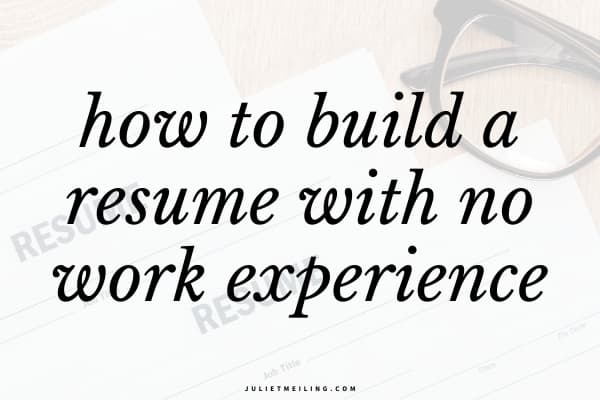
*This post may contain affiliate links. Purchasing a product or service through an affiliate will earn me a small commission at no additional cost to you. Please read our Disclaimer Policy for more information about the use of affiliate links on this site.
How to format your resume for your first job out college
When it comes to creating a winning resume, format matters.
In fact, having an unorganized, unprofessional resume can send your resume right into the trash can before anyone can even read it.
According to HR Drive, job recruiters only look at resumes for an average of 7.4 seconds.
That means you need to format your resume in a way that grabs and holds the attention of job recruiters and hiring managers for an extended amount of time.
So what does this exactly mean in regard to resume formatting?
Simply put, you need to create a winning resume that is:
- To the point
- Highlights your relevant experience(s) in relation to the job you are applying for
In this section we will go into detail about:
- How long your resume should be
- What color(s) and font(s) you should use on your resume
- The general format your resume should follow
- Software options for creating and formatting your resume
How long should a resume be for a college student?
Yes, that’s right–you have one page to make an impression to job recruiters and hiring managers and, hopefully, move forward in the hiring process.
If you have no prior work experience, the one page limit may even be a relief to you.
Even more so, having a one-page limit can help you showcase your most relevant experience and skills related to the job you are applying for instead of adding unnecessary fluffy that may hinder your job prospects.
What color(s) and font(s) should you use on your student resume?
The use and preference of which color(s) you should use on your resume is up for debate .
Some hiring professionals would say only use a black text on a white background, but others would say that it is ok to add some color.
However, it really depends on the job you are applying for and the nature of the workplace.
If you’re applying for a job as a graphic designer, using color on your resume would be more appropriate versus applying for a job as a secretary at a law firm.
In regard to font(s) , it’s simple: use an easy-to-read, clean font like:
- Times New Roman
Also, be sure to use that font consistently throughout your resume (aka no mixing and matching fonts).
Personally, I always stick to black text on a white background with Times New Roman font for all of my resumes (and cover letters).
The general format you should use
Resume creation doesn’t have to be complicated.
Written below is a format you can use for your resume that will keep your resume organized and make it easier for hiring recruiters to find the information they need.
General Format
- Mailing address
- Email address
- Phone number
- Overview or objective statement
- General experience (volunteering/school-related tasks)
- Achievements
- Job-related skills
Notice how this format does not include a section for work experience. As mentioned previously, it is possible to create a complete resume without job experience.
Instead, you can utilize the format to your advantage by fully fleshing out the relevant experience(s) that sheds light on your potential as a candidate for the job.
When you format your resume the right way, you’ll get noticed by recruiters and they will call you in for interviews.
Don’t let the fact that you don’t work experience prevent you from applying to jobs or make you feel you are less qualified. Instead, just make sure to spice things up and add as much value to your resume as possible.
What software can I use to create and format my resume?
Luckily there are plenty of options for creating your resume that are free and easy to use.
The most accessible one being Google Docs .
However, if you aren’t as tech savvy you can use an online resume builder like Resume.com (I personally have used this one).
I personally like using online resume builders because I don’t have to format the resume at all. Instead, all I have to do is focus on writing the text and making sure I have good grammar and punctuation.
The resume builder does the “heavy lifting” for me aka formatting and aesthetics. Plus, I can get the finalized resume as a PDF or Word Document, which is perfect for submitting on Indeed, Monster, or any other job listing website.

Need a physical guide that covers the ins and outs of resume building for college students? This book is my absolute favorite. And although it was written for college students majoring in psychology, the information can be applied to any college student seeking employment after college graduation.
Example resume with no experience
Before going into a few tips and tricks for resume building, below is a resume example for a college student who has no work or internship experience.
Instead, this imaginary student, we’ll call her Jessica Doe, is focusing on highlighting her volunteer and club experience to get her a job as a secondary education teacher.
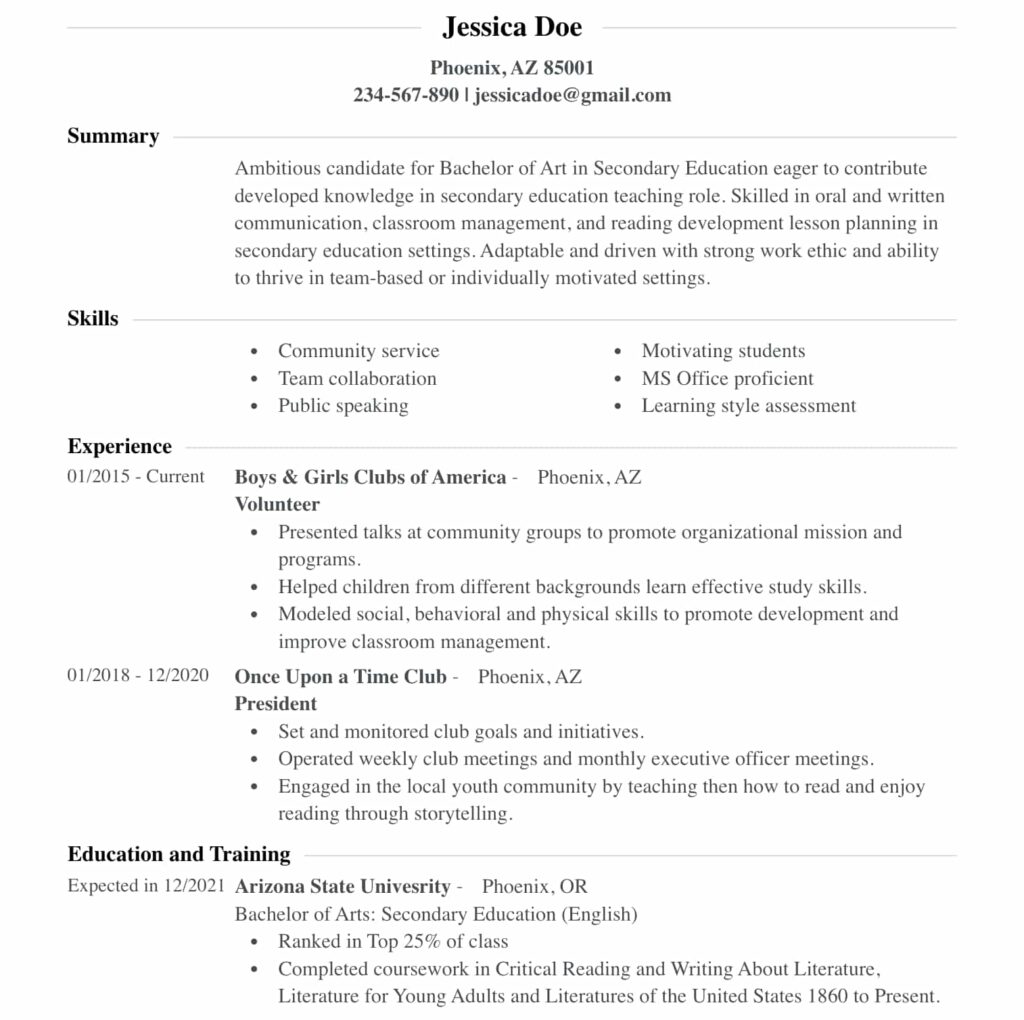
7 tips for building a good resume with no work experience as a college student
How can you make your resume stand out when you have no work experience?
Here are 7 tips that will help you use your non-work experience to your advantage on your resume.
1. Include a complete summary statement
This is often termed as the “overview” or “objective statement” and it plays a critical role in defining the rest of your resume.
This statement should provide insight into what you are aiming for as a budding professional, your skillset, and what you are going to bring to the position you are applying for.
It should only be a sentence or two breaking down what you are going to provide to the employer.
However, remember, the average employer is not looking to learn more about your aspirations. These details don’t matter to them as much as you think!
Instead, they just want to know why you are a good candidate for the particular job listing. This is what you want to make clear in the overview or summary statement.
Here is a brief example taken from one of my resumes: Candidate for Bachelor of Science in Psychology from the University of Georgia with strong communication, organization, time management, and computer skills.
You can find more awesome career objective statement examples by clicking here .
2. Choose the right resume format
When you are fleshing out a resume, you want to format it in a way that showcases you as a job candidate the best.
In general, you are going to want to play around with different option(s):
- Chronological
The format you go with is ultimately up to you, but it is often recommended to go with a format that is easy to follow.
More importantly, if you are inconsistent with the layout, this is going to put you in a bad light professionally.
With a chronological resume , you are going to focus on listing everything based on a timeline. You start with the most recent experience you’ve done and work backward.
On the other hand, a functional resume tends to work well for those with no experience because it is going to focus on your skills.
If necessary, you are always welcome to play around with a hybrid resume format , where you list your skills and achievements while following a chronological order (from most recent to oldest).
3. Focus on grammar and punctuation
It seems silly to say, but you are not going to have as much leeway as a seasoned professional with years of relevant experience.
Employers are not going to be as forgiving when you have grammar or punctuation mistakes. And any grammar or punctuation errors are going to stand out in a bad way.
Even if your resume is chuck full of value, a single misspelling or weird grammatical error can send your resume to the trash bin.
So take your time to go through the resume multiple times. And have other people you know and trust read it beforehand.
I’d recommend getting your mom, dad, or even better, a professor or someone at your university’s career services center to read and critique it.
Having a second, third, or even fourth opinion about your resume can help you create an even better resume and make you stand out despite your lack of work experience.
4. List relevant achievements and or activities
Although you may not have work experience (or very limited work experience) that doesn’t mean you have nothing valuable to add to the workforce.
In fact, you may have a few achievements that would be relevant to the job(s) you are applying for. Or maybe you were part of a club or honor society in college that is relevant.
Whatever it is, make sure to mention it on your resume along with a few bullet points about the achievement or activity that highlights your responsibilities and or accomplishments related to that experience.
For example, if you are applying for an Information Technology (IT) job list any certifications you have obtained or personal projects you have completed.
Or maybe you were part of the gardening club in college and you held a leadership position in that club. On your resume, you can list the duties you had as a leader in the club that relates back to the job you are applying for.
5. Highlight your academic history
One thing on your resume you can use to your advantage is your education.
Many employers love college graduates because they have learned the latest concepts and can add value and innovative ideas to their business.
With your academic history, make sure to highlight how it relates to the job listing.
For example, if you are studying computer science, you can list some core concepts that are related to the IT job that you are applying for. This can include specific coding languages you have learned, like CSS, HTML, Python, C++, etc.
You can also list upper-level classes you have take that relate to the job you are applying for.
But don’t list general education classes like World History or English. They’re too generic and don’t add any true value to your resume.
For example, when I applied for my job as a Vision Therapist, I listed upper-level psychology courses I took that taught me concepts that would be related to the field like Clinical and Counseling Psychology and Abnormal Psychology.
Also, if you have a high GPA (3.5 or above) , be sure to list it on your resume. It can make you stand out amongst the other college graduates applying for the same job as you.
6. Internships
If you had the opportunity to do an internship or co-op in college that relates to the job you are applying for, be sure to list it on your resume.
Internships are equivalent to work experience and can give your resume a nice boost.
However, if you do not have internship experience, consider getting an internship before entering the workforce.
Internships can be a great way to get your foot in the door in a competitive field and allow you to solidify your decision to commit to a long-term job in your field of interest.
7. Highlight your volunteer work
Volunteer experiences can be a great way to make your resume stand out, but again, it is important that this experience is relevant to the job you are applying for.
You for sure don’t want to get carried away with your volunteer experience.
Instead, your volunteer experience should be a small section of the resume and it should reflect that you are a well-rounded individual that cares about the world around them.
For example, if you volunteered at a soup kitchen for 2 years during college, you can list that on your resume and add short bullet points that state how you efficiently communicated with individuals from different backgrounds.
Or maybe you volunteered at a hospital. You could add a bullet point about your ability to work in a high-stress, fast-paced environment.
4 things not to include on your resume
It is very easy to ruin your chances of moving up in the hiring process by making these mistakes on your resume. Here are 4 don’ts when creating your resume with no work experience.
1. Writing samples or photos
Unless you are applying for a job as a journalist or at a publishing agency, there is no reason to submit a writing sample other than your cover letter and resume.
Additionally, submitting a photo of yourself can hinder your ability to get asked back for an interview or hired. Why?
For one, employers do not want to be accused of hiring (or not hiring) you based on your looks. This can be seen as discriminatory and result in legal consequences for the company.
Also, a photo takes up real estate on your resume that you could use to highlight your relevant experience and expertise or even prevent your resume from getting past the applicant tracking system .
2. Unprofessional email address
One of the easiest ways to turn off a hiring manager is to have an unprofessional email address on your resume like [email protected] or [email protected].
Your email address is a reflection of your professionalism, so it is important you keep it simple and professional, like [email protected] or [email protected].
3. Using the wrong keywords
As a job hunter, you may have a lot of difficulty gaining initial traction during your job search.
One of the reasons is because you aren’t using the right keywords in your resume.
As mentioned in tip #1 in this section, many employers now utilize an applicant tracking system (ATS).
This software analyzes and sorts resumes before being read by people who make the actual hiring process decisions.
The ATS is programmed to find resumes that have the right “keywords” in them.
So what does this exactly mean?
This means in your resume, you need to include the exact words used in the job description of the job you are applying for.
So if the job description says they want a “bubbly” individual you need to put that exact phrase in your resume instead of a synonym like, “kind” or “friendly” individual.
Although it does take extra time to comb through each job listing you are applying for and customize your resume to fit each one, it will pay off in the end when you’re getting follow-up emails and phone calls asking you to come in for an interview.
4. Not including a cover letter
Although many job listings do not require you to submit a cover letter, you always want to include a cover letter with your resume.
Including a cover letter that has been written specifically for the job you are applying for can make all the difference in your job search efforts.
It’s also a great way to describe your relevant experience, skills, or expertise in more detail than on your resume, which can help you stand out during your job search.
Final thoughts on how to build a resume as a college student with no work experience
Creating a resume as a college student with no work experience can be a daunting task. However, you should’t let your lack of work experience prevent you from applying to jobs in your field of choice.
In this blog post, we described and highlighted ways you can build your resume without work experience.
This requires you to dig into your education, volunteer, and relevant achievements and activities to curate a resume that shows off your abilities to perform the job you are applying for.
And if you need a more in-depth guide, check out this book written specifically for college students by college professors.
I truly hope this blog post has helped you see how possible it is to build a competitive resume as a college student with no work experience . And as always, good luck!
Related posts to post-grad life and career
- 20 Things You Should Know By Your 20s
- How To Quit Your Job Gracefully
- 9 Ways To Prep For Life After College
- 7 Things No One Tells You About Post-Grad Life
Save this blog post to read or refer back to later by clicking the Pinterest share button below this image.
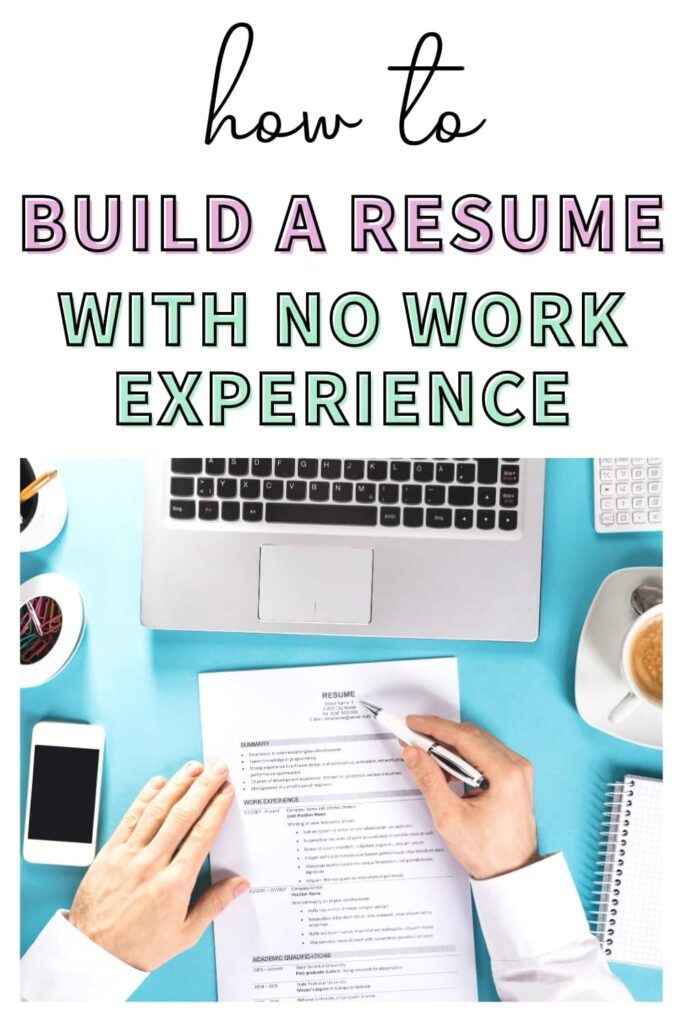
Thanks for reading about how a college student can make a resume with no experience.
Similar posts.

How to Stop Spending Money and Start Saving Money

How to Use the Pomodoro Method to Boost Your Productivity

20 Things You Should Know How To Do By Your 20s

Adulting 101: How to Quit Your Job

15 Useful Valentine’s Day Gift Ideas For Young Adults (2023)

19 Signs It’s Time to Move Out of Your Parent’s House
Student Resume Examples & Guide for 2024

Whether you just graduated college or you’re taking a gap year before continuing your studies, one thing is for sure.
You’re looking for a job.
All that’s standing between you and your next position is a great resume.
But how can you write a resume that stands out from the crowd if all your experience so far is studying?
Don’t worry, we’ve got you covered.
Creating a compelling resume to help you stand out from the crowd is easy, even if you’re just starting on your career journey.
And in this guide, we’re going to teach you how.
Here’s what we’re going to cover:
- What Makes a Great Student Resume Example
- 9 Steps to Writing an Amazing Student Resume
- What to Include In Your Student Resume
Ready? Let’s dive in!

Student Resume Example

That’s a great example of a student resume.
Let’s get into the ins and outs of what it does right:
- Keeps everything on one page. Hiring managers go through hundreds of resumes daily, so it’s important to stick to a one-page resume so they don’t discard your application straight away.
- Uses a reverse-chronological resume format. This is the favorite resume format for hiring managers worldwide since it puts your most recent achievements and experiences first.
- Includes professional contact details. This section should always contain your full name, a professional email address, phone number, location, and any relevant links to professional websites or social media profiles that might boost your application.
- Starts with an eye-catching resume objective. To grab the hiring manager’s attention, this student resume example starts with a strong resume objective to convey their top skills and their professional goal.
- Lists education first. Since this candidate is a recent graduate, their student resume places their education section at the very top and provides details on the relevant courses they’ve taken.
- Focuses on skills. The student resume example pictured above includes a tailored skills section that aligns with the job and shows what they can do for the employer.
- Organizes text in bullet points. This resume uses bullet points instead of large paragraphs, so the content of the resume is organized and easy to read.
- Includes optional sections. The candidate leverages optional sections such as languages and personal projects to add more value to their resume and stand out from other applicants with similar skills and qualifications.
9 Steps Toward the Perfect Student Resume
Now you know what an excellent student resume looks like.
It’s time to create your own.
First things first, let’s go over all the sections your resume should include .
The essential sections of a student resume are:
- Contact Information
- Resume Headline
- Work Experience
If you have leftover space on your resume, you can also use some of the following sections to make your application stand out:
Extracurricular Activities
- Personal Projects
Hobbies and Interests
- Volunteering
- Certificates
Awards and Recognitions
Publications.
As a student or recent graduate, don’t expect to include all of these sections in your resume. Instead, use them to your advantage.
For example, you might not have any work experience, in which case you can replace that section with something else, such as an internship that helped you hone some essential skills for the job you're applying to.
We’ve split the process of creating your student resume into easy-to-follow steps, starting with:
#1. Pick the Right Format
Before you can fill out your resume, you need to decide on the best format for your job application.
There are three resume formats you can choose from:
- Reverse-chronological (also known as the chronological format)
- Functional (also known as the skill-based format)
- Combination (a mix of the reverse-chronological and functional formats)
For 99% of cases, we recommend that you choose the reverse-chronological resume format when making your student resume.
The reverse-chronological format is the most practical, since it lists your most recent experience and achievements first, making it the perfect format when you’re applying for a job.
It’s also hiring managers’ favorite format worldwide, so it’s what they expect to see in your application.
Here’s an example of what the reverse-chronological resume format looks like:

#2. Pay Attention to the Layout
Now that you have the formatting out of the way, it’s time to consider your resume’s layout .
Before the hiring manager reads your resume, they’re going to look at it. And if they see a messy, unorganized document, they aren’t going to be impressed.
Follow these tips to make sure your student resume makes a good first impression:
- Keep it on one page. A good resume should never exceed one page, especially if you’re a student with limited experience. Hiring managers only want the most important details about why you’re the right person for the job.
- Set the line spacing. Make sure your text is easy to read by setting appropriate line spacing. Use 1.0 between text and 1.15 between double lines and after subheadings.
- Adjust the page margins. To make your resume look neat, set your resume’s margins to one inch on all sides of the page. Otherwise, you might end up with a stretched-out or empty-looking document.
- Choose a professional font. Another important aspect of your resume is the font. Pick something professional but not overused. Instead of Times New Roman, go for something understated like Roboto, Lora, or Ubuntu.
- Save it to the right file format. Unless the hiring manager asks for another format, your resume should always be saved as a PDF file . This way, your student resume’s layout is going to look the same across any device or software that the hiring manager uses to open it.
Use a Professional Resume Template Instead
Getting the format and layout of your resume just right can sure get tricky.
You’ll have to spend hours tweaking the margins, adjusting font sizes, and fixing the line spacing – all the while having to make sure nothing spills over to page two.
What if you could skip all the hassle?
Just use one of our free resume templates and create your student resume in minutes.
Each of our professional templates is designed in cooperation with HR professionals from around the world to make sure your application is ATS-friendly, easy to read, and beautiful to look at.
Not to mention, you can choose a resume template that shows off a bit of your personality while adhering to industry standards.
Just look at how one of our templates compares to a standard text editor resume:

#3. Add Your Contact Information
Once you’re ready to fill in the contents of your student resume, it’s time to start with your contact information.
This usually goes in a designated resume header , so it’s easy for the hiring manager to find it at a glance.
Here’s what to include:
- Full Name. (E.g.: John Smith )
- Professional Title. We recommend matching the title to the job you’re targeting (E.g.: Paralegal) or specifying your education. (E.g.: Graphic Design Graduate )
- Email Address. Use a professional email address, not a quirky handle from your World of Warcraft days. (E.g.: write down [email protected] , not [email protected] )
- Phone Number. If you’re applying abroad, always include the dialing code in front of your phone number.
- Location. The city and state/country are enough information.
- Relevant Links. Any other information, such as a link to your LinkedIn profile, GitHub, or a portfolio website, is optional and depends on the job you’re applying for.
Ultimately, your contact information section is the easiest, yet most crucial, section of your student resume.
If you make a single typo in your email or phone number, the hiring manager won’t be able to reach you, and you’ll miss out on an opportunity.
So, before submitting your resume, make sure to double-check, and even triple-check that everything in this section is up-to-date and accurate.
John Smith - Graphic Design Graduate
+1 907 446 1234
linkedin.com/in/john.smith
Fairbanks, Alaska
90744461234
#4. Write a Resume Headline (Summary or Objective)
Hiring managers have to look at countless resumes daily.
So, they won’t spend more than six seconds on each before deciding if it’s worth reading in detail.
This is where a snappy resume summary or objective can make a difference.
Your resume summary or objective is a brief paragraph at the start of your resume that tells hiring managers who you are and what you bring to the table, in just 2-4 sentences.
Depending on your experience, you can take one of two routes:
- Resume summary. If you've got a bit of professional experience under your belt, write a resume summary. It's your chance to give a quick snapshot of your experience, skills, and what you've accomplished so far.
- Resume objective. If you're just starting, a resume objective is the right choice for you. It outlines your skills, any relevant experiences, and your professional goals.
To paint a clearer picture, here’s what a student’s resume summary with more experience might look like:
Recent college graduate with a B.A. in English from University X seeking an entry-level job as a content writer. Previous experience includes working as an English tutor for 2 years at University X, where I worked with 100+ students, helping them improve their essays. Additionally, I managed a personal blog about tech, publishing over 40 articles in the last 3 years.
But if you’re still a student, you probably don’t have a lot of work experience to rely on for your resume summary.
Don’t worry! You can still write a fantastic resume objective, like so:
Enthusiastic recent graduate with a degree in Environmental Science, aiming to secure an entry-level position at Green Solutions Ltd. Experienced in conducting field research and using GIS software through university projects and internships. With a strong passion for sustainability and environmental advocacy, I’m looking to apply academic knowledge in a practical, impactful way.
This goes to show that even without any work experience to leverage, you can still write a job-winning resume .
#5. List Your Education First
While the work experience section is what your resume would usually start with, the rule is reversed when you’re a student or a recent graduate .
If you’re applying for a job in the same field as your education, you want to emphasize the knowledge and skills you’ve gained so far.
So, the less work experience you have, the more detailed your education section should be.
Here’s the most important information that you should include when listing your education :
- Degree Name. (E.g.: BSc in Business Administration )
- University Name. (E.g.: Wharton School of the University of Pennsylvania )
- Location. (E.g.: Philadelphia, PA, USA )
- Years Attended. (E.g.: 09/2018 - 06/2022 )
You should always list your degrees in reverse chronological order, starting with your newest degree (such as a Ph.D. or MBA) and ending with your oldest.
Next, there are a ton of optional details that can look great on your student resume. These include:
- Honors and Awards. Your resume is a great place to show off a little. List any awards or acknowledgments you received during your education. (E.g.: Summa Cum Laude )
- Relevant Coursework. List a few courses that are directly related to the job you’re applying for. (E.g.: Pharmacology, Pathophysiology, Surgical Nursing )
- Thesis or Dissertation. We recommend that graduate and post-graduate students include this, especially if applying to research-heavy fields like data science .
- Minor. If you minored in another field and it’s relevant to the job, include it. (E.g.: BA in Political Science, Minor in Economics )
- Grade Point Average. Include your GPA on your resume if it’s impressive. Anything below 3.5 isn’t worth listing.
Here’s an example of what this looks like on a resume:
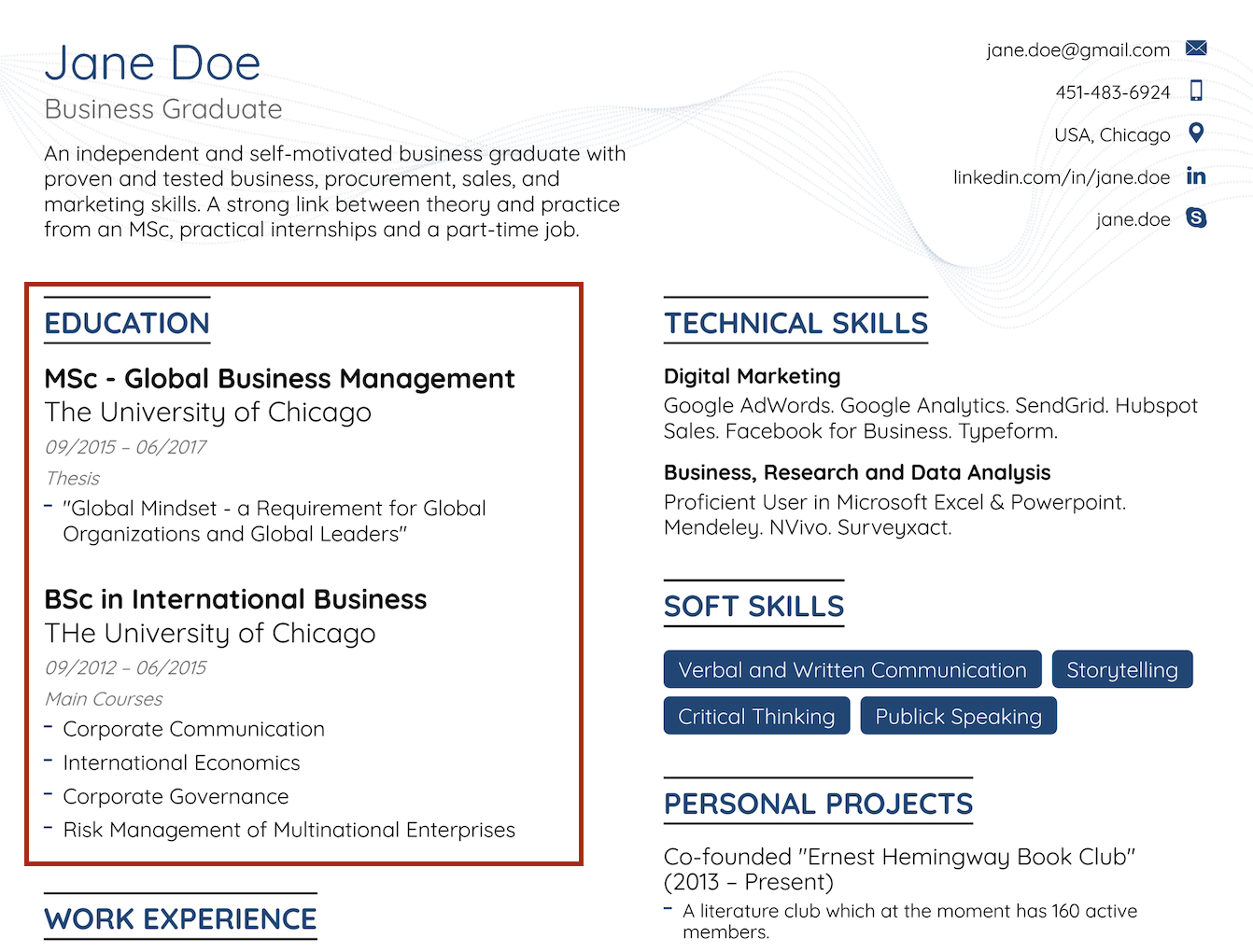
There’s no need to list your high school education unless it’s the only degree you have.
#6. Expand on Your Work Experience
The first thing hiring managers usually want to see is your work experience section .
It’s probably the most important section of your whole resume, and it’s where you need to wow the hiring manager. Here’s how to format it correctly:
- List jobs in reverse chronological order. Start with your latest work experience and work your way back to older roles. Just don’t go too far back – your part-time job over summer break probably doesn’t belong on your resume.
- Add your exact job title. Be accurate when describing your previous job, and avoid buzzwords . If you were a babysitter , say that instead of trying to be witty and going with ‘toddler whisperer.’
- Include the company details. All you need to add are the most important details, such as the company’s name and location. If it’s not a well-known business, you can describe what it does.
- Specify the employment period. Use the mm/yyyy format throughout your student resume instead of specifying the exact dates you started and quit.
- Mention your responsibilities and achievements. Use several bullet points, no more than 5-6 for your most recent work experience and 2-3 for older roles.
Here’s an example of what that looks like in practice:

What If My Work Experience Isn’t Relevant?
If you’re applying for a job in the field you’ve been studying for, you might have picked up a part-time job while you were a student.
So, you’re probably wondering - is that summer gig you did worth mentioning in your resume?
The answer is yes.
Even if your only work experience so far seemingly has nothing to do with the job you’re applying for, it’s probably better for you to include it.
For example, if you worked as a cashier at your local supermarket and now you’re applying for a job as an accountant , there are enough similarities between the two jobs for you to make a great resume.
Just focus on the transferable skills from your time as a cashier. Both jobs require working with numbers, being good at mathematics, and attention to detail.
Usually, showing you have some work experience is better than presenting a resume with zero work experience.
What If I Don’t Have Any Work Experience?
If you’re still a student or you just graduated, you probably don’t have any work experience to leverage.
Don’t worry - most college students don’t.
But that doesn’t have to stop you from writing a great resume!
Hiring managers know that most candidates applying for entry-level jobs aren’t super experienced, and that’s okay.
So, instead of work experience, you can focus on any of the following sections:
- Internships. If your program included any internships or hands-on experiences, mention them. Internships can be super useful on your resume, especially if they help you develop skills for the position you’re applying for, and they can look better on your resume than any part-time job in an unrelated field.
- Volunteering. Having a cause that you care about and are willing to work for shows hiring managers that you’d be a dedicated employee, and that’s why volunteer work looks great on a resume. Whether you spent some time at a local soup kitchen or just helped collect trash in the parks, you can always mention it in your application.
- Projects. Any project you’ve participated in can go here, so long as it’s relevant to the job. Your graduation thesis, coursework, or personal projects can all make a difference. For example, if you’re an aspiring animator and you make funny flash animations that you upload on YouTube for your friends, that’s always a great addition to a first-time job application .
Here’s an example of a student resume that focuses on volunteer experience and personal projects instead of work experience:
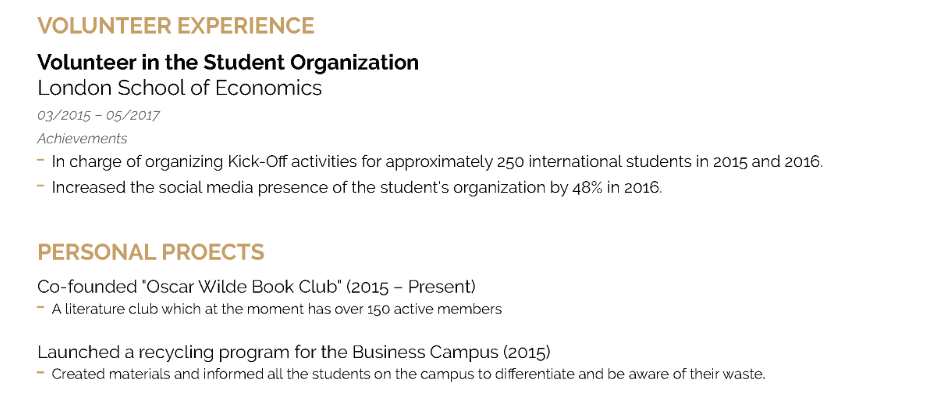
Do you want to join a cause you’re passionate about? Learn how to write a volunteer resume here.
#7. Emphasize Your Relevant Skills
The skills section of your resume should tell the hiring manager what your expertise is and why you’re the perfect candidate for the job.
There are two types of essential skills you can mention:
- Soft skills. These are a mix of social skills, characteristics, and other personal traits. For example, leadership, critical thinking, time management, and so on.
- Hard skills. These are your measurable abilities. So, anything from baking cupcakes to complex coding skills.
Your resume should aim for a mix of both soft and hard skills.
If written correctly, the skill section can look something like this:
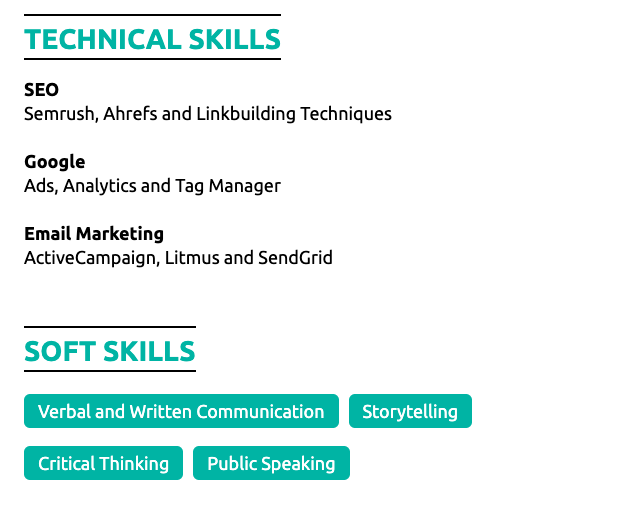
Now, when listing skills on your resume, here are a few essential tips to keep in mind:
- List hard skills with experience levels. For each skill you list, you can mention your proficiency, from beginner to expert. This tells the hiring manager how much training you might need if they hire you.
- Keep it relevant and tailored to the job. You might have some awesome and rare skills, but they’re not always going to be useful. Your Photoshop skills won’t make a difference in an application for a job as a writer .
- Include some universal skills. Some skills can be useful anywhere. These include both soft skills (like communication ) and hard skills (like using Microsoft Office or Google Office Suite).
- Back up your skills. Instead of just listing skills as buzzwords (like “critical thinker” or “problem-solving-master”), make sure you prove what you’re saying. Give examples of when you’ve put those skills to good use, such as in your work experience section.
And for a student resume, here are a few of the top skills almost every single employer will value:
- Verbal and Written Communication
- Adaptability
- Punctuality
- Organizational skills
- Flexibility
- Conflict resolution
- Problem-solving abilities
- Time-management
#8. Leverage Optional Sections
So far, we’ve covered the essential information for your student resume.
But if you have any leftover space, there are a few other sections you can add.
Imagine this: the hiring manager has to decide between you and another candidate, but your resumes are nearly identical. You have very similar experiences, backgrounds, and credentials.
This is where some less essential resume sections can tip the scales in your favor.
Optional sections can help you backup your skills and experience and set you apart from candidates with the same professional background as yours.
These sections include:
Are you fluent in more than one language?
If you’re bilingual or even trilingual, you should always mention that in your resume!
Even if the position you’re applying for doesn’t require any specific language skills, it can still come in handy at some point.
Companies are becoming increasingly international, and you never know when you might end up working on a project or a client where you can put your knowledge to good use.
To list languages in your resume , simply write them down and include your proficiency level:
- Intermediate
Optionally, you can also use the Common European Framework of Reference for Languages (CEFRL) or the American Council on the Teaching of Foreign Languages (ACTFL) proficiency scales.
And remember - you should never lie about your language skills. You never know when the interviewer might turn out to be fluent in the language you claim to know!
As you might remember from your college application , extracurricular activities look great on a resume.
Different after-school projects and clubs can help you gain practical skills and increase your chances of landing a good job right after college. For example, if you were part of a debate team and you’re applying for a job as a lawyer , that could give your resume a boost.
Some activities, like student council responsibilities, show maturity and leadership skills that would translate well to a work environment.
Here’s an example of how to list extracurricular activities on your resume :
EXTRACURRICULAR ACTIVITIES:
Public Speaking Club
Founder and President
09/2018 - 09/2019
- Founded a club to help fellow students improve at public speaking and promote discussion-based events.
- Organized 5+ public speaking lectures.
- Brought in professors from the university and organized 2 speaking workshops.
But regardless of whether they’re related to the job or not, extracurricular activities still show the hiring manager that you’re hard-working and committed.
If you want the hiring manager to get a more well-rounded idea of you as a person, you can include hobbies and interests on your resume .
While this section isn’t going to get you hired, it could tip the scales in your favor.
When the hiring manager is looking at two near-identical resumes from two equally qualified candidates, the deciding factor might come down to something as minor as your personality and interests.
For example, imagine that the company you’re applying to values teamwork and promotes health amongst its employees. If your resume says your hobbies include team sports like basketball, that could convince the hiring manager that you’d be a good cultural fit for their team.
Certifications
The best investment is always in your future, and hiring managers love candidates who do just that.
If you have any extra qualifications or certificates , add them to your resume.
For example, if you graduated with a BA in Marketing, and you’re applying for a Digital Marketing role, that’s great. But it’s even better if the hiring manager sees that you completed an advanced SEO course and that you’re ready to roll!
Do you have a piece of paper with your name on it that says why you’re so smart and qualified? If so, add it to your resume.
It could be an award from a competition or some other recognition of your excellence - academic or otherwise.
For example, you might have been selected for a very rare scholarship , or your hard work as an illustrator won your project a nomination.
You don’t need to be modest on your resume - if you earned something cool, show it off. Any awards can back up your expertise and show the hiring manager that you’re worth a chance.
Have you worked on your university’s student paper? Maybe you’re a freelance writer or a distinguished academic .
Whatever the case is, publications are always impressive on a resume.
Include them under a designated “Publications” section and provide a URL so the hiring manager can check out your work.
#9. Include a Cover Letter
Cover letters are essential for a successful job search , and your student resume won’t be complete without one.
Forbes reports that 56% of hiring managers prefer that applicants include a cover letter with their resume.
Crafting a great cover letter tells the hiring manager that you have an eye for detail and that you’re ready to go the extra mile to join the team. You’re not just randomly sending out the same resume to every job listing you find.
So, to learn how to write your own , let's explore what makes an effective cover letter:

Here are some straightforward tips to make your cover letter great:
- Check your contact information. The information in your cover letter’s header should be the same as what’s on your resume, so double-check for any mistakes.
- Use the hiring manager’s name. A little research can help you find it, and it helps establish a more personal connection than just writing “To Whom It May Concern.”
- Start with a strong opening. Mention a couple of your best skills or achievements right at the start to grab the hiring manager’s attention.
- Go into more detail in the body. Talk about your accomplishments or skills in more detail, and mention anything you couldn’t fit on your resume, like explaining why you want to work remotely .
- Conclude by asking them to reach out. A good closing paragraph includes a call to action that asks the hiring manager to do something, like contact you or arrange an interview.
- Sing it like a professional. Choose an appropriate closing line, like “Best regards” or “I look forward to hearing from you.”
Here’s a great example of a student cover letter :

5 Student Resume Examples
Looking for more resume inspiration?
Check out the different student resume examples below to see what a job-winning resume might look like.
#1. Recent Graduate Resume
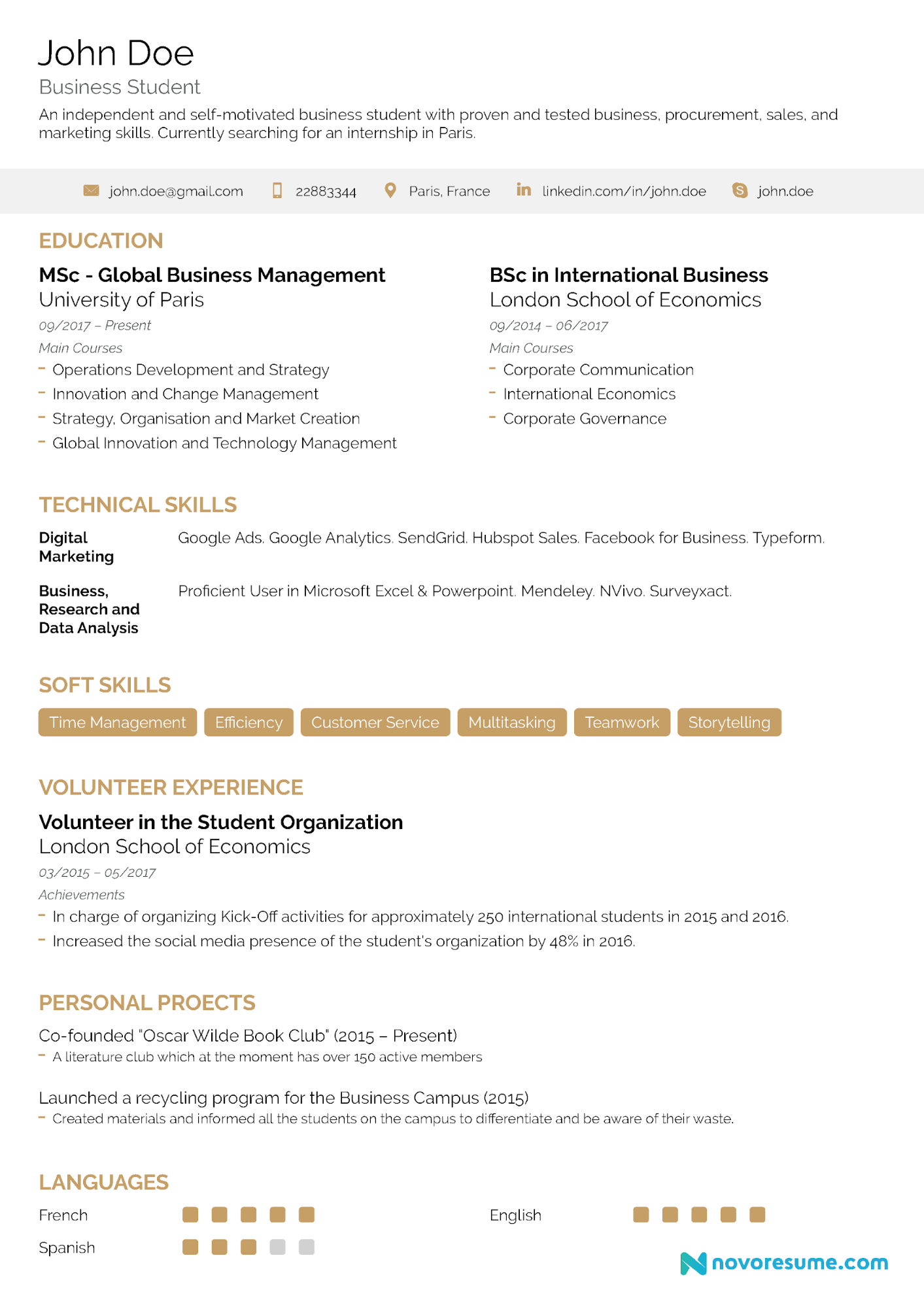
#2. Experienced Student Resume

#3. Internship Student Resume

#4. College Freshman Resume

#5. High School Student Resume

Key Takeaways
And there you go!
That’s how you create a powerful student resume from scratch.
Now, let’s quickly summarize what we’ve learned so far:
- Hiring managers go through hundreds of resumes every day, so you want yours to grab their attention immediately. Write a brief paragraph in your resume header to tell them who you are and why you’re perfect for the job.
- Unlike in most resumes, where work experience goes first, if you’re a student, your education should be at the top of your resume.
- Don’t worry if you don’t have any work experience yet - when you’re applying for an entry-level job, hiring managers don’t expect you to.
- Instead of work experience, you can focus on internships, volunteering, personal projects, or extracurricular activities to show off your skills and fill in your resume.
- Your skills could make or break your job application. Research the most in-demand skills for the job you want and list the ones you have in your resume.
- Always add a matching cover letter to your student resume to show the hiring manager you’re ready to go the extra mile for the job.

To provide a safer experience, the best content and great communication, we use cookies. Learn how we use them for non-authenticated users.
If you’re looking for how to write a summary for your resume with no work experience , you’ve come to the right place. I’m going to walk you through exactly what to do, and then we’ll look at resume summary examples for entry-level job seekers, students and fresh graduates.
How to Write a Summary For Your Resume With No Experience:
First, a resume summary is different than an objective . And it’s much better. Putting an objective on your resume is outdated and unnecessary. Resume objectives are useless because they don’t share anything the hiring manager doesn’t already know (such as “my goal is to obtain a position in the ___ industry”). So what we’re doing here is better and will help your resume stand out from people who simply put an objective. Whereas, the resume summary gives a quick highlight reel of your qualifications, education, and more. If you’re not sure what a resume summary actually is, check out this article on 10 resume summary examples . And while it’s easier to figure out what to put if you’ve built up some work experience, you can still write an effective resume summary with no work experience whatsoever.
So in this article, I’m going to show you how. What should go into your summary when you don’t have any work experience?
1. Put academic accomplishments and leadership
What did you study? Did you just graduate with a degree? Mention that. If you took a leadership role in your class projects, or clubs/groups at your school, you can mention that too. Leadership doesn’t need to be in a job to get the hiring manager’s attention! Taking a leadership role in a sports environment is impressive as well. You’re not going to mention specific accomplishments in your resume summary usually (you can do that later in your resume), but you can say things like “proven leadership” or “natural leader”, etc.
2. Put your interests and passions
Are you passionate about startups and technology? Great, put that. Want to make a difference in the world, and focus your career on social impact? Mention that. This can include the grades you received, but also leadership positions you led, and clubs/groups you participated in.
3. Put “hard” skills
If you’re proficient in any tools, technologies, etc… you can include that in your resume summary. Don’t list 20 things. That’s what your “Skills” section is for. But pick the three or four things that are most relevant for the job you’re applying for.
Coming up in this article, we’re going to look at two resume summary examples for people with no experience. .. and in the second example, you’ll see how this would look.
4. Include soft skills
Are you great at analytical thinking? Do you love working as a part of a team? Are you great at multi-tasking and handling a fast-paced team environment? While these shouldn’t be the main focus of your resume summary section, they can be worth mentioning. It’s especially good to include soft skills that you see mentioned in the job description.
For example, if you see they mention wanting someone who’s great at multi-tasking in a fast-paced environment, and you feel that describes you well, then your resume summary is the perfect place to include this.
5. Put statements that will grab the employer’s interest and make them want to ask you questions!
If you mention leadership they’ll want to ask you more about your leadership experiences. That’s a good thing. Remember, whatever you put, they’ll probably ask you about. So as you write your summary for your resume, try to think about what you want them to discuss with you, and what you want a chance to talk about. And try to “tailor” your resume to fit the companies you’re applying to. If you’re applying to large corporations don’t start your summary by saying “Startup enthusiast”.
3 Resume Summary Example for Students, Fresh Graduates and Entry-Level Job Seekers:
In this section, I’m going to share three examples of how to write a summary for your resume with no experience. You can use these resume summary examples as a student, entry-level job seeker, or any job search where you don’t have experience:
Resume Summary with No Experience – Example #1: Economics Student
Enthusiastic, highly-motivated Economics student with proven leadership capabilities, who likes to take initiative and seek out new challenges.
In this example above, you’re showing that you completed your Economics degree and have an interest in the subject, and you’re mentioning leadership and making the reader want to learn more about this. You’re also making yourself sound ambitious and motivated at the end, which is always a good thing (I’m referring to the part that says “who likes to take initiative and seek out new challenges). Notice the format too. This is how I recommend phrasing it. Don’t say “I am a ___”. Just start with the descriptive words.
This is a simple yet effective resume summary example for students OR recent graduates.
Resume Summary with No Experience – Example #2: Fresh Graduate in Computer Science
Computer Science graduate passionate about data engineering and machine learning. Highly-capable leader, having led multiple Senior class projects to completion. Proficient in a range of modern technologies including Python, Java and Scala.
This is another good example of a student or fresh graduate resume summary that still shows your skills and academic focus, even if you have no formal work experience. In this entry-level resume summary example, you’re highlighting accomplishments and leadership as a student and you’re also showing that you’re passionate about your work. Saying you’re passionate about data engineering is much better than just saying, “Looking for a job in data engineering.” They’ll know you’re looking for jobs because you applied. Taking up space to say it is a bad use of this area of your resume, and is why I never recommend having a resume “Objective” section. The summary exists instead of an “Objective” and is much better.
The example above also included some great programming keywords (Python, Java, Scala) to help get past any automated application systems and grab the hiring manager’s attention very quickly when they first look at your resume. If you work with any tools or technologies that have names like these, you can include it in your entry-level resume summary if you’d like. Other examples of tools/technologies: Photoshop, MS Excel, etc.
If you decide not to include these on your resume summary, make sure to include them elsewhere such as your Education or Skills section .
Resume Summary Example with No Experience #3: Math Student Graduating Soon
4th year mathematics student passionate about statistics and data analysis. Proven project leader. Active member of Boston University’s Mathematics Club. Speaker at 2018 “New York Young Mathematicians Conference.”
This resume summary example for students shows how you can list accomplishments even if you’ve never formally worked before. Did you participate in any clubs at school? Have you led any class projects? These are impressive pieces you can add to your resume summary with no experience formally working.
How to Write a Resume Summary For Students/Fresh Graduates – Quick Recap
- Skip buzzwords like “hard-working” and put real academic accomplishments instead, like projects you produced and tasks you led
- Include what you’re interested in and passionate about to show them why you are applying for this position
- Mention hard skills like “Java Programming” or “Excel,” especially if they’re listed on the job description
- Include soft skills as well like, “excellent at multi-tasking”, especially if you saw these keywords anywhere on the job description
- Include statements in your resume summary that will catch the employer’s interest and make them want to talk with you and ask you more. Remember – the entire goal of your resume is to get invited to interview. So if you did anything unique like giving presentations, working in an internship , participating in a school club, etc., you can include this in your entry-level resume summary.
If you follow the tips above, you’ll have a great entry-level resume summary that will stand out and catch a recruiter’s or hiring manager’s attention so you can get more interviews.
After you write your entry-level resume summary, here are two more articles that may be helpful when job searching with no experience:
- The best times of year to job search
- How to create a great elevator pitch for job hunting

About the Author
Read more articles by Biron Clark
More Resume Tips & Guides
Crafting the perfect resume for teens (template & expert advice), how to beat applicant tracking systems with your resume, what do recruiters look for in a resume, what happens when you lie on your resume 10 risks, don’t say you’re a quick learner on your resume, guide to resume sections, titles, and headings, 12 resume formatting tips from a professional, how artificial intelligence (ai) is changing resume writing, 22 resume bullet point examples that get interviews, are resume writers worth it, 7 thoughts on “resume summary with no experience: examples for students and fresh graduates”.
This site was pretty helpful in guiding me throughout my school resume, would love other tips would do well.
This is a great guide. If only schools were actually interested in teaching children real life skills like this.
Hi, I am a student who has been finding it very difficult to make resumes due to the lack of working experience. I am currently trying to find a job while studying at the same time. I am in University completing a certificate and will soon be applying for a BA in Psychology and Criminolgy. However, I wish to apply for a part time job in the fashion industry. Can you please leave me some tips about what I can do to ensure that I can find a job without needing experience.
Your page has really helped, Thank you.
Hi, I’m a job seeker with 2 years experience working as a cart collector at grocery store and an Associate’s Degree in Computer Information Systems, is this a good professional summary?: “Reliable team member with a keen interest in information technology and other applications. Capable of handling multiple projects within deadlines. Eager to apply my professional and academic background as an Administrative Assistant at Bogdan Contracting.”
I’ve been job seeking since October 2018, I’m hoping I can start a career in tech support as soon as possible.
Hi Marcais,
I think it sounds pretty good. My least favorite part is the first word, though. “Reliable” sounds pretty average/boring. Sure, you show up, do your job, etc. That’s what I think when I hear “reliable”. But not much more.
I’d look for a better word to lead off with.
I would like to say thank you for making this article about writing a summary for a resume. For the past couple of months, I have been struggling to find someone who can help me with that because I don’t have a lot of experience in my field (i.e. engineering). I do have one question though. Is it appropriate to use first-person nouns in the summary section? I have seen people do that, but I find it quite odd.
Please let me know as soon as you can. Thank you.
Hi Frances,
I’d avoid saying, “I” if that’s what you’re asking.
Just say “Led team of 7 people to accomplish ___”
Just start without a pronoun.
Another example: “Highly-accomplished accounting professional who has ____”
Comments are closed.
Purdue Online Writing Lab Purdue OWL® College of Liberal Arts
Welcome to the Purdue Online Writing Lab

Welcome to the Purdue OWL
This page is brought to you by the OWL at Purdue University. When printing this page, you must include the entire legal notice.
Copyright ©1995-2018 by The Writing Lab & The OWL at Purdue and Purdue University. All rights reserved. This material may not be published, reproduced, broadcast, rewritten, or redistributed without permission. Use of this site constitutes acceptance of our terms and conditions of fair use.
The Online Writing Lab at Purdue University houses writing resources and instructional material, and we provide these as a free service of the Writing Lab at Purdue. Students, members of the community, and users worldwide will find information to assist with many writing projects. Teachers and trainers may use this material for in-class and out-of-class instruction.
The Purdue On-Campus Writing Lab and Purdue Online Writing Lab assist clients in their development as writers—no matter what their skill level—with on-campus consultations, online participation, and community engagement. The Purdue Writing Lab serves the Purdue, West Lafayette, campus and coordinates with local literacy initiatives. The Purdue OWL offers global support through online reference materials and services.
A Message From the Assistant Director of Content Development
The Purdue OWL® is committed to supporting students, instructors, and writers by offering a wide range of resources that are developed and revised with them in mind. To do this, the OWL team is always exploring possibilties for a better design, allowing accessibility and user experience to guide our process. As the OWL undergoes some changes, we welcome your feedback and suggestions by email at any time.
Please don't hesitate to contact us via our contact page if you have any questions or comments.
All the best,
Social Media
Facebook twitter.

COMMENTS
5 College Student No Experience Resume Examples & Templates [Edit Free] Sometimes, ambitious college students can't wait to start working. Janee considered how to show value on her resume as a grad: Dreaming of working as a business analyst at Resource Data fueled her to research the company and think of relevant college achievements.
How to format a resume with no experience: Follow the reverse-chronological order (i.e. put the most recent info up top). Add section headings to make your first-job resume easier to navigate. Use professional-looking fonts that are easy on the recruiter's eyes. Stick to the 11-12pt size range for regular text.
Here is how you add an internship to your resume: First, place the Internship section right after the education section. Title it: Internships. Second, write your internship title and role. Be specific. If your internship was in the marketing department, instead of just "Intern", say "Marketing Intern".
Here's how to write a resume when you have no formal work experience, step-by-step: Build My Resume. Our free-to-use resume builder can make you a resume in as little as 5 minutes. Just pick the template you want, and our software will format everything for you. 1. Choose the best format and style for your resume.
College Student Resume: Examples of Summaries. right. Personable and dependable finance sophomore at SUNY with 1 year part-time experience in an accountancy internship. Top customer satisfaction score (98%) and instrumental in bringing in over 500 new clients because of campus outreach efforts.
Here's an example of a detailed, complete education section on a college student's resume: Bachelor of Arts in Political Science. New York University, New York City, Graduated May 2023. GPA: 3.8/4.0. Relevant Coursework: International Politics, Economics, Public Polling, Data Analysis, Electoral Process.
Top ↑ 12 Student Resume Templates #1. Creative Resume Template #2. Basic Resume Template #3. Combined Resume Template #4. Minimalist Resume Template #5. Traditional Resume Template #6. General Resume Template #7. Modern Resume Template #8. IT Resume Template #9.
Try to include five to eight skills in the skills section of your resume. Beneath or next to each one, add evidence. For example: *Strong oral communication skills. Member of college debate team. Tutored students in math, helping them raise their grades from a C to an A*.
A resume summary is a 2-4 sentence summary of your professional experiences and achievements. College Student Resume Summary Example: Dependable marketing sophomore with 1 year part-time experience in a marketing internship to oversee marketing campaigns that maximise profit.
The goal of a first job resume is to demonstrate your value as an employee and show employers why hiring you would benefit their company: 1. Review the job description. Carefully review the job description and note any specific skills you have or requirements you can fulfill.
But first: Here's a job-winning formula for a good resume profile: Start with a personality trait that says you're a great employee, such as "dedicated," "goal-oriented," "personable," etc. Follow with the desired job title, field of study, or education level, e.g., "third-year BBA student" or "personal assistant.".
Here are 7 tips that will help you use your non-work experience to your advantage on your resume. 1. Include a complete summary statement. This is often termed as the "overview" or "objective statement" and it plays a critical role in defining the rest of your resume.
9 college resume tips. When writing a resume for a job application as a college student or recent graduate, consider these tips: 1. Choose the right resume format. Potential employers spend a short amount of time looking at your resume—usually only several seconds. The easier your resume is to scan, the better you can hold their attention.
Just pick the ones that show the skills the job ad wants. These resume examples for college students show how: College Student Resume Education—Example. Job posting wants skills in 1) leadership, 2) marketing, 3) SEO, 4) podcasting, 5) social media, 6) email marketing. Good Example.
Student Resume Objective Example [Candidate with No Experience] Right. Dedicated team player (captain of the swim team for 2 years) (education) with proven leadership and communication skills (strong traits). Seeking an opportunity to leverage my talents as a server at the Mele e Pere Restaurant (position and company).
The trick is to choose and describe them correctly on your CV. Step 1: Create a master list. The master list is a free-form document — electronic or or even a piece of paper — where you write down every skill and quality you can think of. Keep your master list handy for reference whenever a new job opportunity arises.
Write a Resume Headline (Summary or Objective) #5. List Your Education First #6. Expand on Your Work Experience #7. Emphasize Your Relevant Skills #8. Leverage Optional Sections #9. Include a Cover Letter 5 Student Resume Examples #1. Recent Graduate Resume #2.
STEP 2 Choose a format for your first resume. Now that you've identified your job qualifications, here's a secret on how to make a resume with no experience that many students and first-time job seekers don't know about: You have to choose a suitable resume format before you can begin to make a resume for the first time.. There are three standard formats: chronological, functional and ...
17+ Student Resume Examples & Templates. Written By Ida Pettersson. Reviewed By Conrad Benz, Hiring Manager. Our resume examples for students are sleek, free, and properly formatted. Customize one of these templates and use our writing tips to convince employers that you have the skills and knowledge they're looking for. March 4, 2024.
Resume Summary Example with No Experience #3: Math Student Graduating Soon. 4th year mathematics student passionate about statistics and data analysis. Proven project leader. Active member of Boston University's Mathematics Club. Speaker at 2018 "New York Young Mathematicians Conference.".
Here's how to list your education history on an undergrad resume: Start with your associate degree or bachelor's degree at the top. Add the major, school name, school location, and completion date. If you've taken any classes related to the job you're applying to, add them under a "relevant coursework" subsection.
Save your design as a high-quality PDF that's ready to publish; if you need printed copies of your resume. With a beautiful resume template that's ready, you can use it for your job applications anytime. Ace any internship or university job application with free college resume templates you can edit and print from Canva.
Mission. The Purdue On-Campus Writing Lab and Purdue Online Writing Lab assist clients in their development as writers—no matter what their skill level—with on-campus consultations, online participation, and community engagement. The Purdue Writing Lab serves the Purdue, West Lafayette, campus and coordinates with local literacy initiatives.
Our free-to-use resume builder can make you a resume in as little as 5 minutes. Just pick the template you want, and our software will format everything for you. 1. College student format. This resume format is ideal for college students because it features a detailed education section and a simple, modern design.